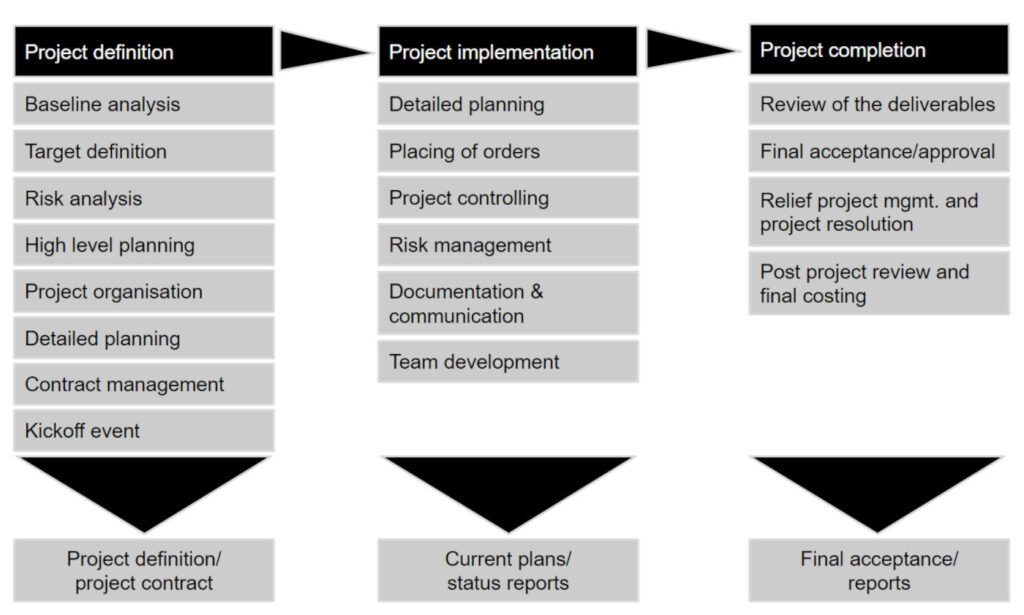Hybrid Project Management, what is that?
In general, hybrid project management is the combination of two or more different methods for managing a project. Hybrid project management is most commonly used when trying to combine classical and agile methods.
Can this work?
Probably not, as the approaches of classic project management methods are diametrically opposed to the principles of agile product development.
Gabler’s Business Encyclopaedia defines project management (PM) as a management task divided into project definition, project implementation and project completion. The aim is to ensure that projects are planned and controlled correctly, that risks are limited, that opportunities are exploited and that project goals are achieved in terms of quality, on time and within budget.
Project management – process modell

Note: Depending on the source and topicality, the graphic of the project management process model may vary a little. But what is common to all representations of the process is the waterfall idea.
As can be seen in the diagram, the project definition phase also includes goal definition, rough planning and detailed planning. These are all aspects that are 100% contrary to the Agile Mindset.
The business dictionary also states that the project goal must be defined clearly and completely, measurable, realisable and scheduled. Is that agile?
A little classical and a little agile. That sounds like „a little pregnant“, doesn’t it?
And even if the detailed planning were omitted, how much agility would still be there if the rough plan is given? And if we take away the goal definition, then the question arises: what is left of classic project management?
In Agile, it is not necessary to know the exact target coordinate of the project, the target direction and the next milestones to be implemented are sufficient.
And it is still being tried!
For example, in high-tech industries with customised product development such as the aerospace industry or defense technology There, the order is usually placed well before the delivery date and the scope of functions was already part of the contract when the order was placed.
Or in the automotive industry, where the product management of the individual brands dictates almost dictatorially what must be included in the vehicle by the already announced release date.
What can be developed in an agile way at all?
We at GesAPro have been supporting customers from different sectors in agile product development for more than 12 years now. We have not yet come across genuine agile hardware development. Here and there, so-called embedded software has been developed, i.e. software that was developed for specific hardware and used on a microcontroller or a microprocessor (examples: automotive, camera technology). Agile development of embedded software is possible, but it has its special challenges. Otherwise, the agile approach is used almost exclusively for software that runs on „standard computers“. On a PC, a server, in a cloud, etc.
Note: If anyone has had experience with agile development of hardware, they are welcome to share their experiences with us.
Conclusion
A hybrid approach to product development is „not meat, not fish“, or, as the Americans like to say, „neither fish nor fowl“.
Whether hardware can be developed in an agile way is something I can’t imagine. I have never seen it. In my opinion, software in general and software built into technology in particular can always be developed agilely, as long as there is a dialogue between the product management of the agile units and the customers and clients on an equal footing and a functional scope to be delivered, including delivery dates, is not dictated unilaterally by decree to supposedly agilely working development units.
And finally, it should be said that there are certainly also framework conditions that make it impossible or not sensible to develop a product agilely; but then one should not do that either.
The purely agile approach they are pursuing is not producing the desired results? Nor does a chosen hybrid approach? Are you currently still developing in a traditional, classical way and don’t really know whether agile would be possible and also make sense?


